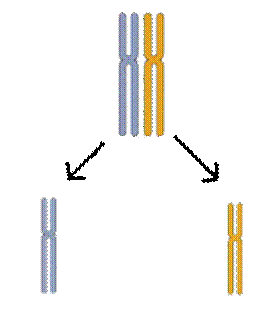 12.
The random separation and mixing up of maternal and paternal chromosomes during
anaphase I is called ____________________.
12.
The random separation and mixing up of maternal and paternal chromosomes during
anaphase I is called ____________________.Meiosis review- We did this is class. Fill in your answer sheet and check your answers at the end.
1.
_____________ is a kind of cell division that produces haploid cells with Ĺ the
number of chromosomes of the parent cell.
A. mitosis
B. meiosis
2. During
oogenesis, the cytoplasm is divided UNEVENLY so that only one mature egg is
produced along with three _________________.
3. The
pairing up of homologous chromosomes during meiosis is called _______________.
4. Cells undergo meiosis to ________________.
A.
grow bigger
B.
repair injuries
C.
replace worn out cells
D.
make gametes
5. The group
of 4 chromatids that forms during synapsis is called a _____________.
6. The
exchange of genetic material between arms of homologous chromosomes is
called________.
7. During
which phase of meiosis does synapsis happen?
8. During
which phase of meiosis does crossing over happen?
9. During
which phase of meiosis does independent assortment happen?
10. In
MEIOSIS a 2n parent cell divides to produce (Pick one answer for each blank)
_____
______________ _____
cells
2 or 4
identical/different
1n/2n
11. The
production of mature sperm cells is called ___________________.
 12.
The random separation and mixing up of maternal and paternal chromosomes during
anaphase I is called ____________________.
12.
The random separation and mixing up of maternal and paternal chromosomes during
anaphase I is called ____________________.
13. The
production of offspring from one parent without joining gametes is called
_____________ reproduction.
14. What
happens to the polar bodies produced during oogenesis?
15. Tell one
advantage of asexual reproduction.
16. Name the
three processes that happen during meiosis which result in genetic
recombination.
17. Body
cells are also called __________ cells.
18. 2n cells
that have two copies of each kind of chromosome are called ____________.
19. Sperm
and egg cells are also called ________
20. The
production of mature egg cells is called __________________.
21.
____________ cells have one copy of each chromosome.
22. Tell the
phase that gets skipped in meiosis.
23. Name the
cell part that provides the energy to move the chromosomes during meiosis.
24. Name the
cell part that helps polar bodies do apoptosis.
25. Where in
the body would you expect to find cells undergoing meiosis?
26. Tell one
advantage of sexual reproduction.
 27.
The separation of homologous chromosomes during meiosis is called _____________.
27.
The separation of homologous chromosomes during meiosis is called _____________.
28. Why does
meiosis during spermatogenesis produce 4 sperm cells but meiosis during
oogenesis produce only 1 egg cell?
29. Sperm or
egg cells are _______________.
haploid or
diploid
30, 31. 32.
Tell 3 ways mitosis and meiosis are different
MEIOSIS CARD REVIEW ANSWER KEY
1. meiosis
2. polar bodies
3. synapsis
4. D. make gametes (A-C are reasons to do
mitosis)
5. tetrad
6. crossing over
7. Prophase I
8. Prophase I
9. Anaphase I
10. 4 different 1n
11. spermatogenesis
12. independent assortment
13. asexual
14. Self digest using apoptosis
15. Donít need a partner; make lots of offspring fast
16. Crossing over, segregation, independent assortment
17. somatic
18. diploid
19. gametes
20. oogenesis
21. Haploid (1n)
22. Interphase II
23. mitochondria
24. lysosomes
25. ovary or testes
26. Provides variety; allows species to adapt to changes in environment;
foundation for evolution
27. segregation
28. All cytoplasm ends up in one cell to provide best start for growing baby
29. haploid
30-32.
|
MITOSIS |
MEIOSIS |
|
Makes cells that are identical to parent and each other |
Makes cells that are different from parent and each other |
|
Makes 2n diploid cells |
Makes 1n haploid cells |
|
Makes 2 daughter cells |
Makes 4 daughter cells |
|
Makes somatic cells |
Makes gametes |
|
Used for growth; repair injuries; |
Used for sexual reproduction |
|
Happens in all kinds of body cells |
Happens only in ovary/testes cells |
|
NO
synapsis/crossing over |
Synapsis/crossing over in Prophase I |
|
NO
segregation |
Segregation/Independent assortment at Anaphase I |
|
Copy DNA every time cell
divides |
Divide twice; copy DNA once |
|
NO
genetic recombination |
Genetic recombination |